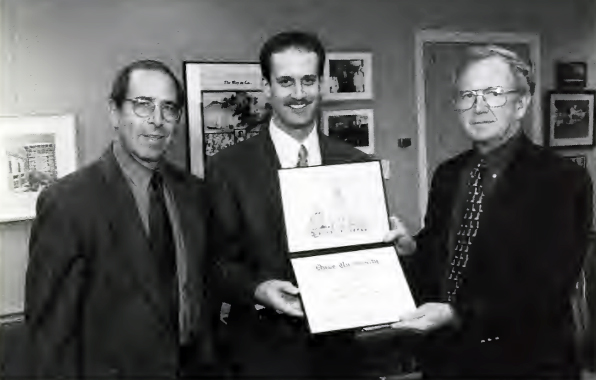Content on this webpage is provided for historical information about the NIH Clinical Center. Content is not updated after the listed publication date and may include information about programs or activities that have since been discontinued.

The NIH-Duke Training Program in Clinical Research (TPCR) has its first graduate, Dr. Douglas Shaffer, a fellow with the Division of Epidemiology and Clinical Applications of NHLBI.
Reflecting on his achievement, Dr. Shaffer said, “This has been a remarkable experience. The TPCR goals of providing formal training in quantitative and methodological principles of clinical research have been exceeded. Not only am I better prepared to conduct clinical research, I feel I’m a better clinician as well.”
The program, which began in 1998, is a collaboration between the Clinical Center and Duke University, in Durham, NC. It uses distance learning to strengthen training opportunities in clinical research. The program is designed primarily for clinical fellows and other health professionals training for careers in clinical research. Courses include research design, statistical analysis, health economics, research ethics, and research management. NIH participants complete coursework primarily through videoconferences with faculty at Duke. NIH staff teach other courses as Duke adjunct faculty.
Dr. Shaffer cites the dedication of the faculty as an important factor for the success of the program.
“There was always consistent, unequivocal support here and in Durham. About halfway through the first semester, many in our group hit a point of overall uncertainty,” he said. Anxious feelings centered on the magnitude of the commitment they had undertaken. “Our statistics instructor from Durham, Dr. Sandra Stinnett, came to Bethesda to meet with us not only as a group, but individually as well. That speaks to the quality and dedication behind this program.” He says this same instructor would notice whenever the Bethesda group became too quiet during a lecture. “She could sense uncertainty on our end, and always quickly intervened.”
The Duke University School of Medicine, which established its program in 1986, awards a Master of Health Sciences in Clinical Research for successful completion of the TPCR. The program can be completed in two 16-week semesters; participants typically spread course work over two years, an approach that Dr. Shaffer recommends. Due to time constraints related to his fellowship, he completed the coursework in one year.
“It’s not optimum,” he said. “You need to think carefully about the best way to manage your time and complete your regular work as well.”
He recommends having a research project in mind before beginning the program, and he credits supportive mentors, Drs. Larry Friedman and Peter Savage, for allowing him flexibility in matching his work with his educational goals.
Unfortunately, Dr. Shaffer has to miss the formal commencement ceremony, to be held in Durham in May.
But as he prepares to move on in his career, he said of the TPCR, “It was the highlight of my experience here. Was it hard? Yes. Bumpy? At times. However, it was well worth the effort.”

